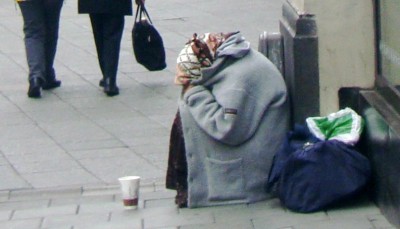UPDATED: Officials from both ends of the political spectrum said they were angered and sad after state broadcaster NRK revealed Tuesday night how many Romanian beggars in Norway appear to be part of criminal organizations that also engage in prostitution, theft and drug dealing. The Romanian men in charge even flaunt ill-gotten gains on social media, including lots of cash, but begging still appears unlikely to be outlawed.

“I’m sad because we see how people are being exploited,” Erlend Horn, a politician from the Liberal Party who’s in charge of social welfare services in Bergen, told NRK. “I’m provoked to see how other people exploit the system in a way that makes those really in need suspected of being part of an illegal network.”
Horn, who nonetheless doesn’t want to ban begging, was reacting to the latest episode of NRK’s investigative program Brennpunkt, which documented how Romanian women who beg on the streets of Bergen during the day change into fashionable clothing in the evening and start selling themselves at night, often to drunken Norwegian men who also find themselves robbed. The money collected is allegedly handed over to the Romanian men who were filmed on the streets as well, and who run houses where as many as 20 Romanian men and women live together in Bergen. Brennpunkt also reported how the alleged Romanian organizers flashed large amounts of cash on social media sites, bragged about drug deals carried out by those working as beggars for them, and jokingly complained while riding on a bus that there weren’t enough passengers on board for them to steal wallets.
NRK reported on Wednesday that the documentary sparked some violent reaction in Bergen. Some beggars showed up a local charitable organization asking for help to travel home to Romania, because they’d been yelled at, kicked and even spat upon. Police said they were sending out extra patrols to restrain angry Norwegians and protect those begging and rummaging through garbarge containers.
Organized crime long suspected
Police officials and social workers in Bergen confirmed on NRK’s documentary, meanwhile, that they long have suspected that Romanian and Bulgarian beggars and prostitutes on the streets are part of organized networks, and some arrests have been made. It can be very difficult, however, to obtain enough hard evidence to produce in court. In the case of one Bergen man robbed at a minibank, surveillance video showed him surrounded by as many as four Romanian women, making it all but impossible to identify exactly which one took his money or snatched his bank card after learning his PIN code.
NRK’s Brennpunkt documentary estimated that as many as 140 people are involved in the criminal network operating in Bergen. All have close ties to one another and come from the city Targu Jiu in the region of Gorj and from the neighbouring county Dolj in Romania. Norway’s trade agreement with the EU means that they’re all allowed entry and residence in Norway, although they can be deported if convicted of crimes.
When police in Stavanger managed to crack down on Romanian networks, which had all but forced other local beggars and prostitutes off the streets, they simply moved on to Bergen, Tromsø, other Norwegian cities and also to Finland, according to Brennpunkt’s research. NRK’s program leaders and journalists spent the past two years charting the movements of the Romanians in Bergen, and their connections to others. Brennpunkt also pin-pointed the leaders of the network in Bergen, calling one “The Kaiser,” another “The King” and yet another “Crown Prince,” and made repeated but unsuccessful attempts to interview them. It remained unclear if NRK’s research will now be used by local police to mount a crackdown of their own.
Organized crime leaders are also believed to be behind Romanian beggars and prostitutes in Oslo, but Brennpunkt stressed that not all beggars on Norwegian streets are involved. Some have actually made their way to Norway on their own, to collect money for families back home in Eastern Europe, and several interviewed fear the organized networks. Few would speak on camera, for fear of being recognized and harassed.
‘Must remain sober’
Neither the top local politician Horn in Bergen nor Member of Parliament Kjell Ingolf Ropstad from the Christian Democrats are willing, however, to propose a new ban on begging in Norway. “We must remain sober,” Horn told NRK, cautioning against stygmatizing all beggars.
“Those who engage in criminal acts and are involved in organized crime must be caught. That’s the job of the police and we, as political authorities, must do what we can to help,” Horn added. “At the same time, we must continue to show compassion for those who have a real need for help, and make sure they are still met with dignity.” Ropstad also told NRK he still didn’t regret his vote against a begging ban in Norway.
Prime Minister Erna Solberg of the Conservative Party, however, and two Members of Parliament for her government partner, the Progress Party, believe it’s time for a national ban on begging instead of leaving it up to local governments.
“I react strongly to this,” Solberg told NRK, after watching the documentary. “At the same time, this isn’t anything new, and we pointed to this problem before the election in 2013.” She said the program doesn’t mean “that all beggars are criminals, but that begging is used with criminal intentions.”
Her government partners agree, but they lack a majority in Parliament. “NRK has documented that Romanian ‘beggars’ in Norway are organized, cynical and relatively well-off,” wrote MPs Harald Tom Nesvik and Ulf Leirstein in a commentary published Wednesday. “Not least we see that begging in most cases is a ruse for criminal activity. Who’s really surprised by that?”
To see photos from the Brennpunkt program, and the program itself, click here (external link to NRK, in Norwegian, but excerpts of the subjects’ own video that’s been posted on social media are in Romanian.)
newsinenglish.no/Nina Berglund

